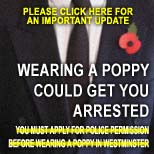"for thine especial safety"
posted by k
I'm used to checks on my belongings. Gloved hands root around in the embarrassing contents of my bag. Curious eyes gaze at family photos tucked in my diary. Sometimes there are comments on my choice of reading or my sandwiches. Sometimes an item will excite attention and I've learnt to avoid carrying a penknife, nail-file or corkscrew.
On Wednesday my water bottle was the unexpected focus - a pristine bottle of San Pellegrino bought as a luxury for the journey home. "Could you just open this and take a drink?"
This wasn't an aiport. It was the main entrance to the British Library.
Thus I learned that water bottles are suspicious items. Not vacuum flasks - I wasn't asked to drink the lukewarm dregs of the coffee I'd enjoyed on the journey down.
I can live with the inconvenience of an occasional unwanted drink of water. But why was this the only baggage-check I faced that day? I'd just got off an inter-city train where only my ticket was checked. Nobody asked me to taste that, thank goodness. When I returned on another intercity train, I had no problems in boarding complete with water bottle and all sorts of suspicious items banned on planes, including a laptop computer and two spectacle cases.
I'd rather not be blown up, in mid-air or a library, but security seemed strangely selective. I didn't see a single policeman all day, though I passed King's Cross, site of last year's bombs.
I don't know if a plot has been foiled or if intelligence services have misinterpreted telephone chatter. Craig Murray's book (see previous post) warns that "intelligence" may be derived from torture of suspects and their relatives overseas - an unspeakably disgusting procedure which I once thought Britain opposed. Under torture, people commonly end by saying whatever their interrgators seem to want, regardless of truth.
A court of law must determine whether there was a plot and whether the people detained are guilty or innocent. In the meanwhile, I'll take precautions, but I'd rather not be infected by terror of what may not even be true. We are all mortal and face danger. Britain remains far safer than much of the world.
Justice and equality for all before the law are vital to a free and democratic society. All suspects are innocent until proved guilty; it is impossible to work fairly from any other assumption. But government ministers, President Bush, and most of the press have prejudged the case. They want us to be very afraid - in that climate of fear, how can the British citizens arrested have any hope of a fair trial?
If the right to a fair trial is endangered, so are all our rights. All citizens, visitors and residents depend for all our rights on justice and equality before the law.
I'm used to checks on my belongings. Gloved hands root around in the embarrassing contents of my bag. Curious eyes gaze at family photos tucked in my diary. Sometimes there are comments on my choice of reading or my sandwiches. Sometimes an item will excite attention and I've learnt to avoid carrying a penknife, nail-file or corkscrew.
On Wednesday my water bottle was the unexpected focus - a pristine bottle of San Pellegrino bought as a luxury for the journey home. "Could you just open this and take a drink?"
This wasn't an aiport. It was the main entrance to the British Library.
Thus I learned that water bottles are suspicious items. Not vacuum flasks - I wasn't asked to drink the lukewarm dregs of the coffee I'd enjoyed on the journey down.
I can live with the inconvenience of an occasional unwanted drink of water. But why was this the only baggage-check I faced that day? I'd just got off an inter-city train where only my ticket was checked. Nobody asked me to taste that, thank goodness. When I returned on another intercity train, I had no problems in boarding complete with water bottle and all sorts of suspicious items banned on planes, including a laptop computer and two spectacle cases.
I'd rather not be blown up, in mid-air or a library, but security seemed strangely selective. I didn't see a single policeman all day, though I passed King's Cross, site of last year's bombs.
I don't know if a plot has been foiled or if intelligence services have misinterpreted telephone chatter. Craig Murray's book (see previous post) warns that "intelligence" may be derived from torture of suspects and their relatives overseas - an unspeakably disgusting procedure which I once thought Britain opposed. Under torture, people commonly end by saying whatever their interrgators seem to want, regardless of truth.
A court of law must determine whether there was a plot and whether the people detained are guilty or innocent. In the meanwhile, I'll take precautions, but I'd rather not be infected by terror of what may not even be true. We are all mortal and face danger. Britain remains far safer than much of the world.
Justice and equality for all before the law are vital to a free and democratic society. All suspects are innocent until proved guilty; it is impossible to work fairly from any other assumption. But government ministers, President Bush, and most of the press have prejudged the case. They want us to be very afraid - in that climate of fear, how can the British citizens arrested have any hope of a fair trial?
If the right to a fair trial is endangered, so are all our rights. All citizens, visitors and residents depend for all our rights on justice and equality before the law.


